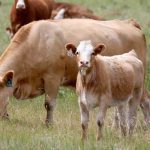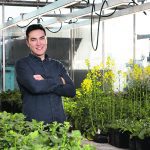Striped species has always had a natural ability to tolerate neonics, but the insecticide remains effective against crucifers
WINNIPEG — Many generations of flea beetles have been exposed to neonicotinoids in Western Canada over the last two decades. Farmers across the Prairies plant 20 million acres of canola and most of the seeds, year after year, have been coated with neonicotinoid insecticides, commonly known as neonics. From 2017 to 2022, there were many […] Read moreTag Archives RDAR

New program focuses on data literacy for cow-calf producers
Case studies and mentoring will help give farm data decision-making power
A project to increase the use of data in cow-calf operation decision-making has brought together organizations and researchers from across the sector. The Data Literacy for Cow-Calf Producers project aims to give farmers and ranchers the chance to discuss best practices and learn from experts and peers about how to use data to make better […] Read more

Hemp sector sees success in hybrid varieties
WINNIPEG — Alberta’s hemp industry has decided to go in a new direction with the focus on increasing yields and reducing the price point of a crop that’s too expensive for most food companies and many fibre processors. The Alberta Hemp Alliance is pursuing a project that will deliver new genetics to farmers — high-yielding […] Read more

On-farm research called agriculture’s best bet
Speakers at a recent conference say better communication needed so research gets into the hands of producers
There needs to be better communication between all segments of the agriculture industry so that agricultural research gets into the hands of producers, said Mark Redmond, chief executive officer of RDAR.
Potato research targets disease
The research is part of wider efforts to combat economic loss in the burgeoning potato industry in southern Alberta, which is expected to grow with expansion of the McCains processing facility and expanded irrigation networks.

Agricultural organization approves 39 research projects
Agriculture Funding Consortium to spend $11.49 million on projects ranging from antibiotic resistance to climate change
Thirty-nine research projects totalling $11.49 million will try to help farmers remain resilient in the face of challenges ranging from a changing climate to antibiotic resistance. “Research is very important, and what you see is 18 organizations coming together to invest, in many situations, producer dollars to improve the profitability, sustainability and competitiveness of Alberta […] Read more



